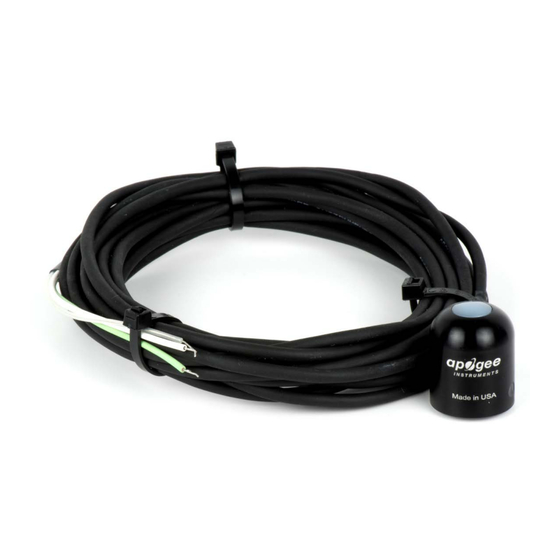Table of Contents
Advertisement
Quick Links
Advertisement
Table of Contents

Summary of Contents for Apogee SQ-212
-
Page 1: Owner's Manual
OWNER’S MANUAL QUANTUM SENSOR Model SQ-212, SQ-222, SQ-215, and SQ-225 (including SS models) APOGEE INSTRUMENTS, INC. | 721 WEST 1800 NORTH, LOGAN, UTAH 84321, USA TEL: (435) 792-4700 | FAX: (435) 787-8268 | WEB: APOGEEINSTRUMENTS.COM Copyright © 2018 Apogee Instruments, Inc. -
Page 2: Table Of Contents
TABLE OF CONTENTS Owner’s Manual ..........................................1 Certificate of Compliance ....................................3 Introduction ..........................................4 Sensor Models ......................................... 5 Specifications ........................................... 6 Deployment and Installation ....................................9 Operation and Measurement ................................... 11 Maintenance and Recalibration ..................................15 Troubleshooting and Customer Support..............................16... -
Page 3: Certificate Of Compliance
(PBB), polybrominated diphenyls (PBDE). Further note that Apogee Instruments does not specifically run any analysis on our raw materials or end products for the presence of these substances, but rely on the information provided to us by our material suppliers. -
Page 4: Introduction
(transmitted) PPFD measurement in the same environments. Apogee Instruments SQ series quantum sensors consist of a cast acrylic diffuser (filter), photodiode, and signal processing circuitry mounted in an anodized aluminum housing, and a cable to connect the sensor to a measurement device. Sensors are potted solid with no internal air space, and are designed for continuous PPFD measurement in indoor or outdoor environments. -
Page 5: Sensor Models
SENSOR MODELS This manual covers quantum sensor models SQ-212/SQ/222 and SQ-215/SQ-225, which provide a voltage signal. Additional models are covered in their respective manuals. Model Signal Calibration SQ-212 0-2.5 V Sunlight SQ-222 0-2.5 V Electric light SQ-215 0-5 V Sunlight... -
Page 6: Specifications
Calibration Traceability Apogee SQ series quantum sensors are calibrated through side-by-side comparison to the mean of four Apogee model SQ- 110 or SQ-120 transfer standard quantum sensors under high output T5 cool white fluorescent lamps. The transfer standard quantum sensors are calibrated through side-by-side comparison to the mean of at least three LI-COR model LI-190R reference quantum sensors under high output T5 cool white fluorescent lamps. - Page 7 Spectral Response Mean spectral response of six SQ series quantum sensors (error bars represent two standard deviations above and below mean) compared to PPFD weighting function. Spectral response measurements were made at 10 nm increments across a wavelength range of 300 to 800 nm in a monochromator with an attached electric light source.
- Page 8 Directional, or cosine, response is defined as the measurement error at a specific angle of radiation incidence. Error for Apogee SQ series quantum sensors is approximately ± 2 % and ± 5 % at solar zenith angles of 45° and 75°, respectively.
-
Page 9: Deployment And Installation
Mount the sensor to a solid surface with the nylon mounting screw provided. To accurately measure PPFD incident on a horizontal surface, the sensor must be level. An Apogee Instruments model AL-100 Leveling Plate is recommended to level the sensor when used on a flat surface or being mounted to surfaces such as wood. To facilitate mounting on a mast or pipe, the Apogee Instruments model AL-120 Solar Mounting Bracket with Leveling Plate is recommended. - Page 10 Inline cable connectors are installed 30 cm from the head (pyranometer pictured) Instructions Pins and Wiring Colors: All Apogee connectors have six pins, but not all pins are used for every sensor. There may also be unused wire colors inside the cable. To simplify data logger connection, we remove the unused pigtail lead colors at the data logger end of the cable.
-
Page 11: Operation And Measurement
Connect the sensor to a measurement device (meter, datalogger, controller) capable of measuring and displaying or recording a voltage signal with a range of 0-2.5 V (SQ-212/222) or 0-5 V (SQ-215/225) to cover the entire range of PPFD from the sun. In order to maximize the measurement resolution and signal-to-noise ratio, the signal input range of the measurement device should closely match the output range of the quantum sensors. - Page 12 Sensor Calibration Apogee amplified quantum sensor models have a standard PPFD calibration factor of exactly: SQ-212, SQ-222: 1.0 µmol m per mV SQ-215, SQ-225: 0.5 µmol m per mV Multiply this calibration factor by the measured mV signal to convert sensor output to PPFD in units of µmol m Calibration Factor (0.5 µmol m...
- Page 13 SQ-215 and SQ-225. The weighting functions for PPFD and YPFD are shown in the graph below, along with the spectral response of Apogee SQ series quantum sensors. The closer the spectral response matches the defined PPFD or YPFD spectral weighting functions, the smaller spectral errors will be.
- Page 14 Spectral Errors for PPFD and YPFD Measurements with Apogee SQ Series Quantum Sensors Radiation Source (Error Calculated Relative to Sun, Clear Sky) PPFD Error [%] YPFD Error [%] Sun (Clear Sky) Sun (Cloudy Sky) Reflected from Grass Canopy -6.3 Reflected from Deciduous Canopy -7.0...
-
Page 15: Maintenance And Recalibration
MAINTENANCE AND RECALIBRATION Moisture or debris on the diffuser is a common cause of low readings. The sensor has a domed diffuser and housing for improved self-cleaning from rainfall, but materials can accumulate on the diffuser (e.g., dust during periods of low rainfall, salt deposits from evaporation of sea spray or sprinkler irrigation water) and partially block the optical path. -
Page 16: Troubleshooting And Customer Support
Conversion factors for common radiation sources can be found on the Unit Conversions page in the Support Center on the Apogee website (http://www.apogeeinstruments.com/unit-conversions/;...















Need help?
Do you have a question about the SQ-212 and is the answer not in the manual?
Questions and answers